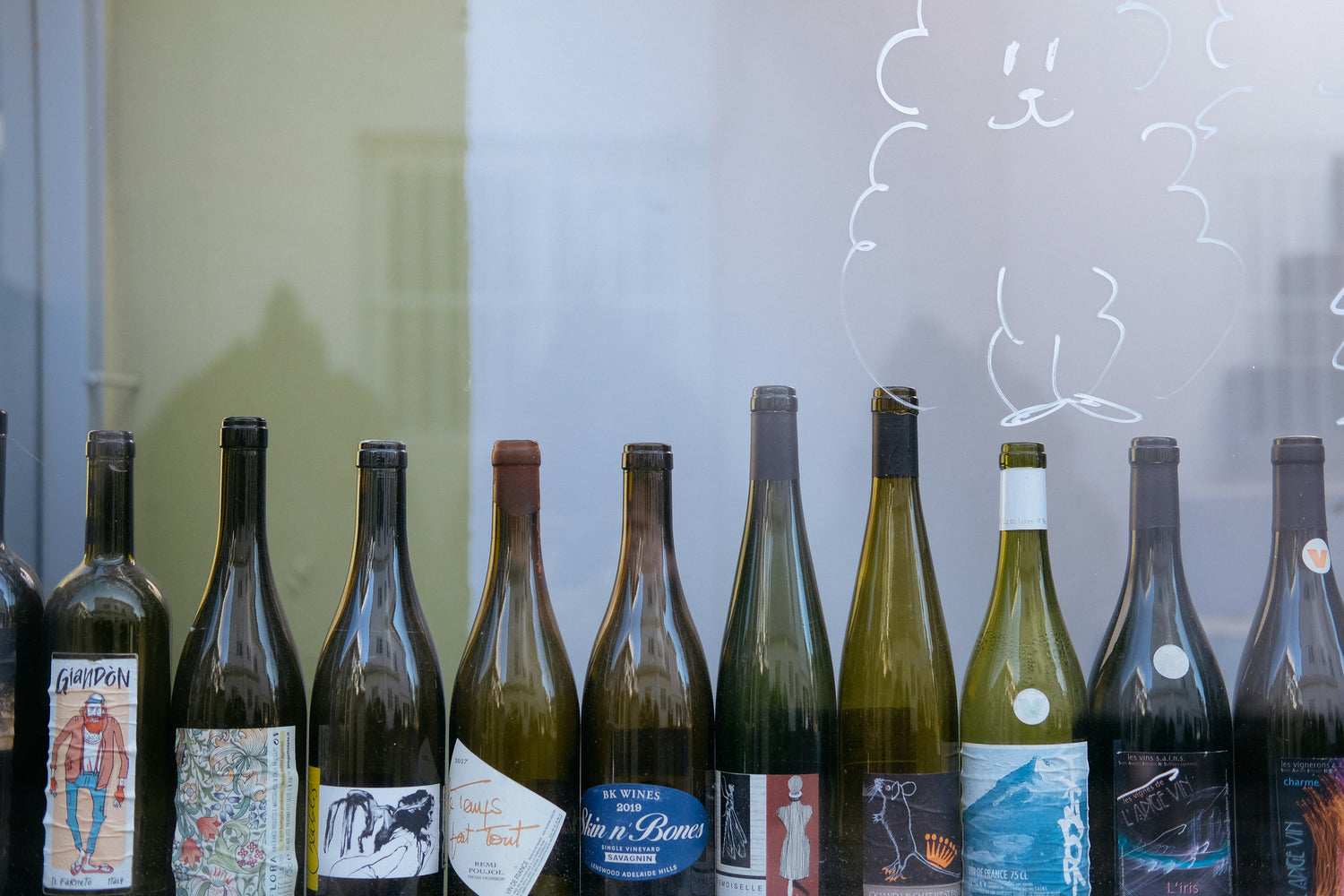
Natural Wine Benefits: Why Your Body (And Planet) Will Thank You
gregory Kinsman-ChauvetShare
Natural Wine Benefits: Why Your Body (And Planet) Will Thank You
Natural wine benefits have spread more than ever, with sales growing by 13.8% year-over-year as people look for healthier and sustainable drinking choices. The natural wine movement has gained momentum as consumer trust in brands that openly share their environmental effects has reached 74%, showing an evident change in wine-drinking priorities.
People's purchasing choices now favour organic and biodynamic wines made without synthetic pesticides or herbicides. These eco-friendly, low-intervention wines also contain fewer sulfites than conventional varieties and might reduce those dreaded post-wine headaches. Your wine-drinking experience could become exceptional once you understand natural wine's benefits, whether you care about health or the environment.

What Makes Natural Wine Different
"Natural wine is simply unadulterated fermented grape juice with no additives in the winemaking process." — Wikipedia, Free online encyclopedia
Natural wine comes from pure fermented grape juice without any alterations. Conventional wines can contain up to 60 FDA-permitted additives [1], but natural wines stick to the simple rule of "nothing added, nothing taken away" [2].
No added chemicals or preservatives
Natural wines stand out because of their pure ingredients. These low-sulfite wines have much lower sulfite levels - only 30 to 40 parts per million [3] compared to 350 ppm in conventional wines [4]. Natural winemakers skip synthetic pesticides and herbicides in their vineyards and use organic farming methods instead, often resulting in sulfite-free wine or preservative-free wine.
Traditional fermentation process
The wine's fermentation happens with native yeasts that naturally exist on grape skins [5]. This wild yeast fermentation creates wines with unique traits, like a creamy, oily texture that comes from longer fermentation times [6]. The process is simple - crush the grapes and let nature work to make wines that showcase their true character and terroir expression.
Minimal intervention approach
Natural winemakers follow a hands-off approach throughout the wine-making process. The wines often look cloudy and keep their natural sediment [4] because winemakers skip conventional winemaking's standard filtering and clarifying steps. This minimal intervention winemaking lets the wine's natural flavours and aromas come through clearly; each bottle tells its vineyard's story.
Natural winemakers pick their grapes by hand [2]. This takes more work but will give each bottle a better fruit quality. The careful selection and lack of manipulation create unfiltered wines that truly reflect where they come from.

Health Benefits of Natural Wine
"We live for natural, healthy and probiotic food... and if you make natural wine without any additives - its there (that is it)" — Partida Creus, Natural winemaker
Scientific research shows natural wines offer significant health benefits because of how they're made. Studies indicate natural wines have much lower sulfite levels - between 10-100 parts per million (ppm), and most stay below 30 ppm [7].
Lower sulfite content
Sulfites naturally form during fermentation, and natural wines keep these levels minimal at 5-20 milligrams per liter [8]. Conventional white wines add much more - typically 100-150 milligrams of sulfites [8]. Only 2-3% of people have sulfite intolerance [9], though sensitivity can change over time. Many natural wines are marketed as "no added sulfites" or "low-sulfite wines" to appeal to health-conscious consumers.
Higher antioxidant levels
Natural wines pack more beneficial compounds like resveratrol and polyphenols [10]. These antioxidants shield your body from oxidative stress and inflammation. Red wines contain two main types of flavonoids - flavan-3-ols and anthocyanins - which act as powerful natural antioxidants [11]. The higher antioxidant content in natural wines is often touted as a key natural wine health benefit.
Reduced chemical exposure
Natural wine producers use organic wine production methods that avoid synthetic pesticides and fertilizers [12]. This appeals to health-conscious people worried about chemicals building up in their food and drinks [12]. Research shows natural wines affect your body differently - a newer study published in 2021 found they created lower blood alcohol concentration peaks (0.52) versus conventional wines (0.56) [13], suggesting a potential lower alcohol content in natural wines.
How Natural Wine Affects Your Body
Research reveals interesting details about how natural wine affects our bodies. Studies show these wines have beneficial compounds that work uniquely with our digestive system [14].
Easier digestion
Natural wines contain living elements like native yeasts and good bacteria [15]. Notwithstanding that, the probiotic benefits aren't as high as many people think. Alcohol kills most beneficial bacteria, which means the wine has nowhere near the probiotic content of fermented foods like kimchi or yoghurt [16].
Saccharomyces cerevisiae, a wild yeast used in natural fermentation, helps our body absorb essential minerals like zinc, magnesium, and calcium better [15]. Many people say they can handle natural wines better, likely because these wines skip the heavy processing and additives [10].
The Environmental Impact of Wine-Making
Soil health leads the environmental story of wine. Many conventional vineyards still use industrial agriculture practices. They rely on synthetic fertilizers and intensive tilling that harm soil biology [22]. Natural wine producers choose organic farming methods to protect and improve soil fertility, embracing sustainable viticulture practices.
Traditional vs natural methods
Traditional winemaking borrows many practices from industrial agriculture, but this comes with risks. Synthetic pesticides and intensive plowing greatly reduce soil biodiversity [22]. Natural winemakers create balanced ecosystems and use cover crops between vine rows. These crops help retain soil moisture and nutrients [23]. This method rebuilds soil strength by copying natural ecosystems [22], aligning with biodynamic practices and sustainable winemaking principles.
Carbon footprint comparison
Traditional and natural wine production methods show apparent differences in their environmental effects. Here's how various factors add to the overall carbon footprint:
- Glass bottle production accounts for 55% of total greenhouse gas emissions [24]
- Vineyard operations contribute 36-50% of environmental impacts [24]
- Soil regeneration can store 3.5 metric tons of CO2 per acre [22]
- Natural farming methods can save 18,000 gallons of water per acre [22]
Climate change brings new challenges to the wine industry through floods, fires, and droughts [22]. All the same, regenerative farming practices show promise. For instance, rebuilding soil could save 10.8 trillion gallons of water yearly in California alone [22]. Some wineries already show these practices work at scale. Montinore Estate manages over 200 acres of biodynamic vines [22], demonstrating the viability of sustainable winemaking on a larger scale.
Making the Switch to Natural Wine
The quickest way to learn about natural wines starts with their unique labelling system. France's innovative "Vin Méthode Nature" certification requires wines to meet specific standards. These include hand-harvested grapes from certified organic vines that ferment using only indigenous yeasts [25]. This natural wine certification helps consumers identify authentic natural wines.
At Just Grapes, we ensure that all wines meet the highest quality standards, as not all wines are certified.
Reading wine labels
Natural wines typically show regional names like "Vin de France" or "Wein aus Österreich" [3]. These labels point to wines produced with century-old methods instead of modern industrial processes. It's worth mentioning that natural wines often display broader geographical areas rather than specific regions [3]. Understanding natural wine labelling is crucial for consumers looking to explore this category.
Understanding certifications
Each region has its natural wine regulations. The French "Vin Méthode Nature" permits:
- Up to 30 mg/L of sulfur dioxide post-fermentation
- No synthetic additives or processing aids
- Only hand-harvested, organic grapes
- Indigenous yeast fermentation [26]
These certifications help ensure the quality and authenticity of natural wines, giving consumers confidence in their choices.
Conclusion
Natural wines radically change how we drink wine today, and they're healthier too. These wines have fewer additives and chemicals than conventional wines, but their benefits go way beyond personal health. Environmentally responsible farming helps rebuild soil health, saves water, and reduces wine production's effect on our environment.
Natural wines might taste different from what you're used to at first. Their unique qualities show authentic expressions of terroir and grape varieties. The natural wine taste is often described as more vibrant and alive than conventional wines. Science backs up claims about their lower sulfite content and higher antioxidant levels. You should think carefully about some common beliefs about their benefits, though.
You don't need to complicate your switch to natural wines. Just Grapes finds certified producers and trusted importers. This works especially when you have strict natural winemaking techniques to guide you. Each bottle tells its own story through careful cultivation and minimal chemical intervention. These wines truly reflect where they come from, showcasing the best of organic wine production and sustainable viticulture.
Natural wines are a great choice whether you care about health benefits, environmental impact, or authentic wine experiences. This movement keeps growing, and more producers will likely embrace these traditional, environmentally responsible winemaking methods. As the natural wine movement continues to gain momentum, it's clear that this approach to winemaking is more than just a trend – it's a return to the roots of wine production, with benefits for both consumers and the planet.
References
[1] - https://news.wine.co.za/news.aspx?NEWSID=39160 [2] - https://www.dryfarmwines.com/blogs/a-matter-of-taste/natural-wine-vs-regular-wine?srsltid=AfmBOooSUeuAoDhctv3qX4aSDVsoYc_6p95gmlto9qrqGVWeJtx4dAdm [3] - https://www.wineenthusiast.com/culture/natural-wine-labels/?srsltid=AfmBOorfuhWIXS7OulP6cqpU6nASMQldhypBzUzc9-bdZ0HzzwnLFwaU [4] - https://www.foodandwine.com/wine/what-is-natural-wine [5] - https://www.coravin.co.uk/blogs/community/what-is-natural-wine-the-naked-truth?srsltid=AfmBOoqOqvW6SOQQAYWm72952iec8fTqUZOROVhtnTnq-JDdPTLl7zJj [6] - https://winefolly.com/deep-dive/whats-up-with-wild-fermentation-wine/ [7] - https://naturalmerchants.com/organicwines/sulfites-in-wine/ [8] - https://asopwines.com/blogs/q-a-shorts/q-a-shorts-are-there-sulfites-in-natural-wine?srsltid=AfmBOorHFYlW3uy6l8OyXM6tnk9VebriRerrTljXdbQ8uI5tUSzS5LLD [9] - https://www.nytimes.com/2022/09/23/well/eat/natural-wine-health-hangovers.html [10] - https://morenaturalwine.co.uk/blogs/natural-wine/the-health-benefits-of-natural-wine [11] - https://pubmed.ncbi.nlm.nih.gov/12074960/ [12] - https://theearthwine.com/blogs/natural-wine-journal/is-natural-wine-better-for-your-health-an-in-depth-look?srsltid=AfmBOoqzY7qUsCMdLYx_FS_gr1lVaFprpocssfoMD7EVGghDgPnymHDo [13] - https://pubmed.ncbi.nlm.nih.gov/31052212/ [14] - https://www.discovermagazine.com/health/natural-wine-and-the-debate-over-healthy-alcohol [15] - https://www.dryfarmwines.com/blogs/a-matter-of-taste/natural-wine-and-gut-health?srsltid=AfmBOoquD9p4UDd-dBb2qC7pJe3zzHzqCYVWzyn3UM5W4N5gj4STK0sv [16] - https://www.winespectator.com/articles/natural-wine-low-sulfur-sulfites-gut-microbiome-digestion [17] - https://www.medicalnewstoday.com/articles/sulfites-in-wine-headache [18] - https://www.eatingwell.com/article/7903986/can-these-wine-drops-save-you-from-headaches-heres-what-the-science-says/ [19] - https://www.saveur.com/story/drink/truth-about-natural-wine-and-hangovers/ [20] - https://daily.sevenfifty.com/what-new-research-about-wine-headaches-means-for-natural-wine/ [21] - https://www.healthline.com/health-news/health-benefits-natural-wine [22] - https://www.bonappetit.com/story/is-natural-wine-better-for-the-planet?srsltid=AfmBOor8jhzs_3UPYIkF0NXMSVISpK0sEu2Af2f7BSSbz39c2qxjumE_ [23] - https://tanninandoak.com/blogs/the-knowledge/understanding-sustainable-wine-organic-biodynamic-and-natural-methods [24] - https://www.mdpi.com/2071-1050/14/22/15483 [25] - https://morenaturalwine.com/pages/all-producers-1?srsltid=AfmBOoqzI9He5Wc6CiO0H5vDhNESlO99R0BtVljVpCB5xlA7sk6e1di6 [26] - https://www.wineenthusiast.com/culture/wine/natural-wine-definition-france/?srsltid=AfmBOopoiV5o0IDBh1QFyvePH3BYcOCz4AiQ1-srf15_Qw84msJXaq1n [27] - https://www.reddit.com/r/wine/comments/14e0r55/how_to_tell_if_a_wine_is_considered_a_natural_wine/ [28] - https://www.specialityfoodmagazine.com/food-and-drink/natural-wine-everything-you-need-to-know

